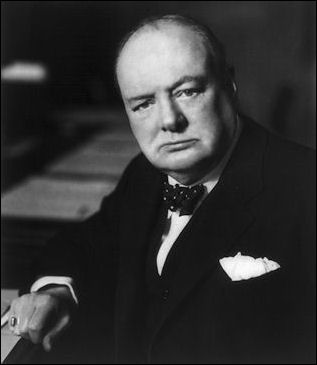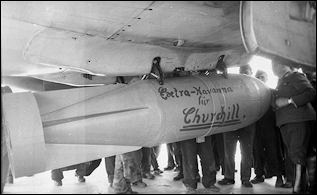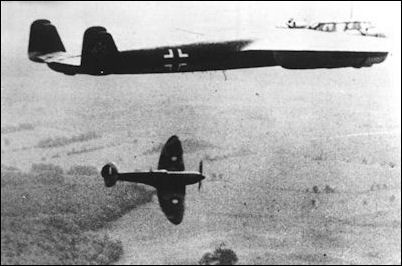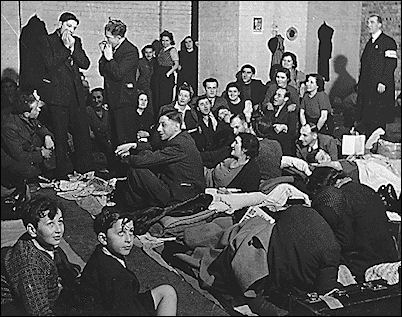![]()

Britain Stands Alone
Every European leader thus far challenged by Adolf Hitler had either backed down or been conquered. By the summer of 1940, the Führer stood at the pinnacle of world power – feared by most, admired by many, and absolutely worshiped by his own people. Upon his return to Berlin after his conquest of France, he enjoyed an outpouring of popular delirium unprecedented in German history.
But there was a problem in all of this. For Hitler, the greater the success, the more he came to see himself as an infallible genius, compounded by the notion that if he, the Führer, said such and such a thing was true – then it must be true. It was the return of his old nemesis – megalomania. Bit by bit, it would become his worst enemy, clouding his judgment as he went forward, prompting him to act rashly, providing opportunities for his opponents they would not miss.
The first such misjudgment by the Führer occurred even before the ink was dry on the French surrender document. By now, Hitler had already turned his full attention to Great Britain. He was absolutely sure the British would respond positively to a magnanimous offer by him to let them hang onto the British Empire throughout the world, as long as the British publicly acknowledged his right to rule a Nazified Europe, thereby granting him a free hand to do whatever he pleased on the entire continent, without interference.
But he was wrong.
Upon the collapse of France, the new British Prime Minister, Winston Churchill, told his people: “Hitler knows that he will have to break us in this island or lose the war. If we can stand up to him all Europe may be free, and the life of the world may move forward into broad, sunlit uplands; but if we fail, then the whole world will sink into the abyss of a new Dark Age. Let us therefore brace ourselves to our duties and so bear ourselves that, if the British Empire and its Commonwealth last for a thousand years, men will still say: ‘This was their finest hour.’ ”
Churchill flatly refused to discuss anything with Hitler or any Nazi representative.
Reacting to such blatant and unprecedented defiance, Hitler assembled the Wehrmacht High Command on Tuesday, July 16, 1940, and ordered them to plan for the conquest of Britain.
Meanwhile, three days later, Hitler the politician ascended the world stage once more, giving a speech to the Nazi Reichstag, broadcast live on radio in Germany and around the world. He portrayed Churchill as a war monger and himself as a reasonable man desiring peace. "I feel a deep disgust for this type of unscrupulous politician who wrecks whole nations," Hitler said of Churchill. "I feel it to be my duty before my own conscience to appeal once more to reason and common sense in Great Britain as much as elsewhere. I consider myself in a position to make this appeal since I am not the vanquished begging favors, but the victor speaking in the name of reason."
Once more, Germans took the Führer at his word, concluding the British would be to blame for any continuation of the war. Hitler by now had learned to play his own people like a master fiddler. He even confided to the Italian ambassador, "It was always a good tactic to make the enemy responsible in the eyes of public opinion in Germany and abroad for the future course of events. This strengthened one's own morale and weakened that of the enemy."
Though the German people were easily swayed by Hitler, his generals were not. They had grave doubts that a seaborne invasion across the English Channel into southern England would ever succeed. The chief problem was that Britain's immensely powerful Royal Navy, aided by the increasingly dangerous Royal Air Force (RAF), would likely blast any seaborne troops out of the water. And any Germans attempting to wade ashore would encounter home-based British Army divisions, including many of the same men who had just escaped from Dunkirk.
Regardless, Hitler ordered preparations to move forward, eyeing a possible launch date of mid-September 1940. As a result, the High Command dutifully concocted Operation Sea Lion involving an invasion by 260,000 German soldiers to be ferried across the English Channel from northern France. But now the head of his navy, Grand Admiral Erich Raeder, spoke up and advocated a much later invasion date, perhaps May of 1941, to allow adequate time for naval preparations.
For the moment, Hitler paused to mull things over. On the one hand, he wanted to punish the openly defiant Churchill, but on the other hand, his Wehrmacht clearly wasn't ready for action.
Sensing a golden opportunity to curry favor with the Führer, his old crony, Hermann Göring, Chief of the Luftwaffe, stepped up and boasted that his warplanes alone could force Churchill to his knees. It would be a daring, unprecedented alternative – to wage war entirely from the sky.
With no better option available, Hitler decided to give it a try. And so, on Thursday, August 15, 1940, an attack against southern England was launched by the world’s largest air force – the Battle of Britain had begun.
Göring's first priority was to destroy the RAF itself, by targeting its airfields, warplane factories, communication stations and radar posts. Challenging this aerial onslaught were young British pilots, many right out of college, who scurried aloft in their new Spitfire and Hurricane fighter planes. At the onset, the Germans enjoyed a numerical advantage, hurling a thousand bombers, along with an equal number of fighter planes against 800 British fighters. The two sides battled furiously in the skies over England, knowing the fate of Britain and perhaps even the world was hanging in the balance.
Although British Fighter Command had fewer planes it had an important tactical advantage in aerial radar, which the Germans did not have yet. As wave upon wave of German bombers emerged, British pilots stayed in constant radio communication with coastal radar operators and fellow pilots. They were perfectly positioned to intercept and took a steady toll of the lumbering bombers and slower German fighters. British pilot Richard Hillary recalled his feelings toward the German presently in his gun sight: “I wondered what he was like, this man I would kill. Was he young, was he fat, would he die with the Führer’s name on his lips, or would he die alone…I would never know.”
Göring soon realized success would not come easily. Not wanting to lose face with the Führer, he stepped up the pressure, throwing everything in his arsenal against the RAF, beginning on Saturday, August 24th. Over the next two weeks, the British suffered terribly, losing 466 planes. Fighter Command was desperately low on planes and pilots, flying its very last reserves. The Germans, by sheer weight of numbers, stood on the brink of victory.
But they didn't know this.
Göring had no idea the RAF was nearly knocked out. And now, in one of the great turning points of World War II, the German strategy abruptly changed.
It began by sheer accident. German bombers that were supposed to hit military targets on the outskirts of London strayed off course and instead bombed London proper, killing civilians inside their homes. Churchill assumed it was deliberate and British bombers retaliated by conducting the first-ever air raid on Berlin, capital of Nazi Germany. The nighttime bombing was small in scale, but hugely symbolic. Germans were utterly shocked. They had been personally assured by Göring time and time again their cities were impenetrable.
Hitler was furious. It was yet another blow to his prestige by the bombastic British. On September 4th, he told his people, "When the British Air Force drops two or three or four thousand kilograms of bombs, then we will in one night drop 150, 230, 300 or 400,000 kilograms. When they declare they will increase their attacks on our cities, then we will raze their cities to the ground. We will stop the handiwork of those night air pirates, so help us God! The hour will come when one of us will break and it will not be National Socialist Germany!"
And so the attacks against the battered RAF facilities were halted in favor of nighttime terror bombings against London to retaliate for the raids on Berlin and to break the morale of the British people so they would pressure Churchill to capitulate.
Starting on Saturday, September 7, 1940, and for 57 consecutive nights, London was struck. During the Blitz, as it came to be known, the people awoke each night to shrieking air raid sirens, then hurried from their homes to designated shelters including subway stations and basements in big buildings. They huddled together, listening as thunderous destruction fell from the sky, staying awake most of the night nervously. At dawn, they emerged sleepy-eyed and went home to see if it was still there, gazing meanwhile at the wreckage of local shops and the ruins of cherished historical buildings. Despite it all they did not break. Rather, they went to work on time, helped neighbors in need, or helped to clean up the street. "Business As Usual," could be seen everywhere, written in chalk on boarded-up shop windows.
Meanwhile, British air raids continued on Berlin and other German cities, including Munich, the birthplace of Nazism. Hitler responded by adding a dozen British cities to Göring's target list including Birmingham, Liverpool and historic Coventry which was obliterated when 449 bombers dropped 1,400 high explosive bombs and 100,000 incendiaries.
Bombings of this magnitude brought something completely new to modern warfare – the firestorm – fueled by super-heated winds drawing in torrents of air to fan whirling walls of flames. Sometimes people were knocked off their feet by the rushing winds and sucked into the flames to be burned alive. In London, on the night of December 29, 1940, a firestorm scorched the whole area around St. Paul's Cathedral.
The death toll of British civilians steadily mounted, surpassing 15,000 by the end of 1940. But so too, did the German death toll mount, especially Luftwaffe pilots. The German emphasis on terror bombings against Britain's cities had given the RAF time to spring back to life by repairing its airfields, building new planes and training new fighter pilots.
As a result, incoming German bombers were shot down in ever increasing numbers. The air war thus evolved into a battle of attrition in the sky, and the Germans were losing skilled pilots and planes by the hundreds, with no end in sight. If this continued, the Luftwaffe would be broken in the skies over England. All the while, Churchill and the British people remained steadfast and undaunted.
Göring's boast had proven empty. The Battle of Britain was lost. The Luftwaffe had come up short again – just as it did at Dunkirk.
Against the odds, the young fighter pilots of the Royal Air Force had withstood everything the Germans could throw at them and saved Britain, inspiring Winston Churchill to say, "Never in the field of human conflict was so much owed by so many to so few."
With the air war against Britain unsuccessful, Hitler postponed all plans for the invasion of England. Instead, he ordered the Luftwaffe to transfer its entire resources to Eastern Europe. Nazi Germany, the Führer had now decided, would bring Churchill to his knees and achieve final victory in the war not by conquering Britain, but by conquering Russia.
Copyright © 2010 The History Place™ All Rights Reserved
![]()
NEXT SECTION - Attack on Russia
The Defeat of Hitler Index
The History Place Main Index Page
Terms of use: Private home/school non-commercial, non-Internet re-usage only is allowed of any text, graphics, photos, audio clips, other electronic files or materials from The History Place.



